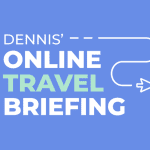Skift Take
With parent company Alphabet generating $79 billion in revenue in the first half of 2020, Google is relentlessly rolling out new travel products. Not to mention, it is dictating content-licensing and advertising terms to cash-strapped partners while a pandemic rages. Enough said.

Dennis' Online Travel Briefing
Editor’s Note: Every Wednesday, Executive Editor and online travel rockstar Dennis Schaal will bring readers exclusive reporting and insight into the business of online travel and digital booking, and how this sector has an impact across the travel industry.
While there has been much discussion about Google taking an inflexible approach toward travel companies’ pandemic-driven past-due bills, and many figured out a way to pay them, Google actually cut off and banned advertisements from a well-known online travel company.
The CEO discussed the issue under the proviso that his company would not be publicly identified because he'd still like to work out something with Google. Anyone in the online travel industry would know the know the firm, which is currently banished from advertising in Google channels.
Meanwhile, a third-party collection agency that Google uses is trying to force payments.
When the online travel company's revenue fell into the coronavirus abyss with a 90 percent drop in March, the executive told his Google account reps that he wouldn't be able to pay the outstanding bills until a travel industry recovery took place or the firm secured new financing.
"They rejected a payment plan without presenting an alternative and froze our accounts," the CEO said. "They are telling us we need to pay all outstanding invoices in full before they will reactivate our accounts."
A recent Google search that previously would have triggered this company's advertisements, found none. Instead, we found the first free link for the company in a different kind of abyss — page three of Google search results. That's the online